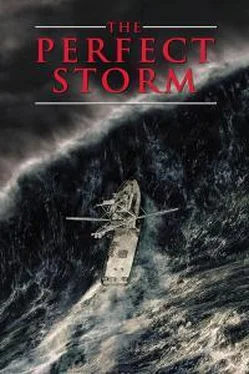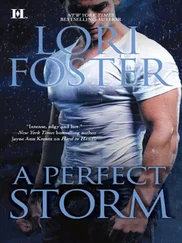Sebastian Junger - The Perfect Storm
Здесь есть возможность читать онлайн «Sebastian Junger - The Perfect Storm» — ознакомительный отрывок электронной книги совершенно бесплатно, а после прочтения отрывка купить полную версию. В некоторых случаях можно слушать аудио, скачать через торрент в формате fb2 и присутствует краткое содержание. Жанр: Триллер, Проза. Описание произведения, (предисловие) а так же отзывы посетителей доступны на портале библиотеки ЛибКат.
- Название:The Perfect Storm
- Автор:
- Жанр:
- Год:неизвестен
- ISBN:нет данных
- Рейтинг книги:3 / 5. Голосов: 1
-
Избранное:Добавить в избранное
- Отзывы:
-
Ваша оценка:
- 60
- 1
- 2
- 3
- 4
- 5
The Perfect Storm: краткое содержание, описание и аннотация
Предлагаем к чтению аннотацию, описание, краткое содержание или предисловие (зависит от того, что написал сам автор книги «The Perfect Storm»). Если вы не нашли необходимую информацию о книге — напишите в комментариях, мы постараемся отыскать её.
The Perfect Storm — читать онлайн ознакомительный отрывок
Ниже представлен текст книги, разбитый по страницам. Система сохранения места последней прочитанной страницы, позволяет с удобством читать онлайн бесплатно книгу «The Perfect Storm», без необходимости каждый раз заново искать на чём Вы остановились. Поставьте закладку, и сможете в любой момент перейти на страницу, на которой закончили чтение.
Интервал:
Закладка:
Murph and Sully drive to the Cape Ann Market out on Route 127 and begin stalking up and down the aisles throwing food into their carts by the armful. They grab fifty loaves of bread, enough to fill two carts. They take a hundred pounds of potatoes, thirty pounds of onions, twenty-five gallons of milk, eighty-dollar racks of steak. Every time they fill a cart they push it to the back of the store and get another one. The herd of carts starts to grow—ten, fifteen, twenty carts—and people stare nervously and get out of the way.
Murph and Sully grab anything they want and lots of it: ice cream sandwiches, Hostess cupcakes, bacon and eggs, creamy peanut butter, porterhouse steaks, chocolate-coated cereal, spaghetti, lasagna, frozen pizza. They get top-of-the-line food and the only thing they don't get is fish. Finally they get thirty cartons of cigarettes—enough to fill a whole cart—and round their carts up like so many stainless steel cattle. The store opens two cash registers especially for them, and it takes half an hour to ring them through. The total nearly cleans Sully out; he pays while Murph backs the truck up to a loading dock, and they heave the food on and then drive it down to Rose's wharf. Bag by bag, they carry $4,000 worth of groceries down into the fish hold of the Andrea Gail.
The Andrea Gail has a small refrigerator in the galley and twenty tons of ice in the hold. The ice keeps the baitfish and groceries from spoiling on the way out and the swordfish from spoiling on the way home. (In a pinch it can even be used to keep a dead crew member fresh: once a desperately alcoholic old fisherman died on the Hannah Boden, and Linda Greenlaw had to put him down the hole because the Coast Guard refused to fly him out.) Commercial fishing simply wouldn't be possible without ice. Without diesel engines, maybe; without loran, weather faxes, or hydraulic winches; but not without ice. There is simply no other way to get fresh fish to market. In the old days, Grand Banks fishermen used to run to Newfoundland to salt-dry their catch before heading home, but the coming of the railroads in the 1840s changed all that. Suddenly food could be moved faster than it would spoil, and ice companies sprang up practically overnight to accommodate the new market. They cut ice from ponds in the winter, packed it in sawdust and then sold it to schooners in the summer months. Properly packed ice lasted so long—and was so valuable—that traders could ship it to India and still make a profit.
The market for fresh fish changed fishing forever. No longer could schooner captains return home at their leisure with a hold full of salt cod; now it was all one big race. Several full schooners pulling into port at once could saturate the market and ruin the efforts of anyone following. In the 1890s, one schooner had to dump 200 tons of halibut into Gloucester harbor because she'd been beaten into port by six other vessels. Overloaded schooners built like racing sloops dashed home through fall gales with every inch of canvas showing and their decks practically awash. Bad weather sank these elegant craft by the dozen, but a lot of people made a lot of money. And in cities like Boston and New York, people were suddenly eating fresh Atlantic cod.
Little has changed. Fishing boats still make the same mad dashes for shore they were making 150 years ago, and the smaller boats—the ones that don't have ice machines— are still buying it in bulk from Cape Pond Ice, located in a low brick building between
Felicia Oil and Parisi Seafoods. In the old days, Cape Pond used to hire men to carve up a local pond with huge ice saws, but now the ice is made in row upon row of 35O-pound blocks, called "cans." The cans look like huge versions of the trays in people's refrigerators. They're extracted from freezers in the floor, skidded onto elevators, hoisted to the third floor, and dragged down a runway by men wielding huge steel hooks; the men work in a building-sized refrigerator and wear shirts that say, "Cape Pond Ice—The Coolest Guys Around." The ice blocks are shoved down a chute into a steel cutting drum, where they jump and rattle in terrible spasms until all 350 pounds have been eaten down to little chips and sprayed through a hose into the hold of a commercial boat outside.
Cape Pond is one of hundreds of businesses jammed into the Gloucester waterfront.
Boats come into port, offload their catch, and then spend the next week making repairs and gearing up for the next trip. A good-sized wave can bury a sword boat underwater for a few seconds—"It just gets real dark in here," is how Linda Greenlaw describes the experience—and undoing the effects of a drubbing like that can take days, even weeks. (One boat came into port twisted.) Most boats are repaired at Gloucester Marine Railways, a haul-out place that's been in business since 1856. It consists of a massive wooden frame that rides steel rollers along two lengths of railroad track up out of the water. Six-hundred-ton boats are blocked up, lashed down, and hauled ashore by a double-shot of one-inch chain worked off a series of huge steel reduction gears. The gears were machined a hundred years ago and haven't been touched since. There are three railways in all, one in the Inner Harbor and two out on Rocky Neck. The harbor railway is the least robust of the three and terminates in a greasy little basement, which sports a pair of strangely Moorish-looking brick arches. The other two railways are surrounded by the famous galleries and piano bars of Rocky Neck. Tourists blithely wander past machinery that could rip their summer homes right off their foundations.
The Andrea Gail had been touched up at the Railways, but most of her major work was done in St. Augustine, Florida, in 1987. Almost three feet were added to her stern to accommodate two 1,900-gallon fuel tanks; the whaleback deck was extended aft nine feet; and a steel bulwark on the port side was raised and extended eighteen feet. In addition, twenty-eight fuel-oil drums, seven water drums, and the ice machine were stored on the whaleback.
In all, perhaps about ten tons of steel, fuel, and machinery were added to the whaleback. The weight had been added high up, eight feet or so above the deck and perhaps twice that high above the waterline. The boat's center of gravity had been changed just a little. The Andrea Gail would now sit more deeply in the water, recover from rolls a bit more slowly.
On the other hand, she could now put to sea for six weeks at a time. That, after all, was the point; and no man on the boat would have disagreed.
GOD'S COUNTRY
Going to sea is going to prison, with a chance at drowning besides.
—SAMUEL JOHNSON
BY midafternoon the Andrea Gail is ready: The food and bait have been stowed away, the fuel and water tanks have been topped off, spare drums of both have been lashed onto the whaleback, the gear's in good order, and the engine's running well. All there remains to do is leave. Bobby climbs off the boat without saying anything to Bugsy—they're still morose after their fight—and walks across the parking lot to Chris's Volvo. They drive back across town to Thea's and trot up her front steps in a soft warm rain. Thea hears their feet on the stoop and invites them in and takes her cue from a quick glance from Chris. I've got some errands to do, I'll be back in a few hours, she says. Make yourselves at home.
Chris and Bobby tug each other into the dark bedroom and lie down on the bed. Outside, the rain taps on. Chris and Bobby can't see the ocean but they can smell it, a dank taste of salt and seaweed that permeates the entire peninsula and lays claim to it as part of the sea. On rainy days there's no getting away from it, wherever you go you breathe in that smell, and this is one of those days. Chris and Bobby lie together on Thea's bed, talking and smoking and trying to forget the fact that this is his last day, and after an hour the phone rings and Bobby jumps up to answer it. It's Sully on the line, calling from the Crow's Nest. It's five o'clock, Sully says. Time to go.
Читать дальшеИнтервал:
Закладка:
Похожие книги на «The Perfect Storm»
Представляем Вашему вниманию похожие книги на «The Perfect Storm» списком для выбора. Мы отобрали схожую по названию и смыслу литературу в надежде предоставить читателям больше вариантов отыскать новые, интересные, ещё непрочитанные произведения.
Обсуждение, отзывы о книге «The Perfect Storm» и просто собственные мнения читателей. Оставьте ваши комментарии, напишите, что Вы думаете о произведении, его смысле или главных героях. Укажите что конкретно понравилось, а что нет, и почему Вы так считаете.












